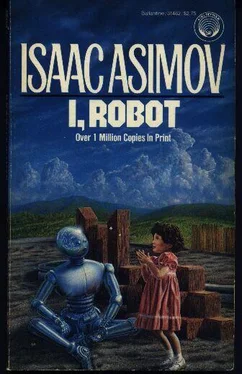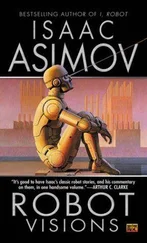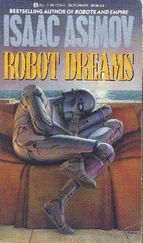Isaac Asimov - I, Robot
Здесь есть возможность читать онлайн «Isaac Asimov - I, Robot» весь текст электронной книги совершенно бесплатно (целиком полную версию без сокращений). В некоторых случаях можно слушать аудио, скачать через торрент в формате fb2 и присутствует краткое содержание. Жанр: Фантастика и фэнтези, на английском языке. Описание произведения, (предисловие) а так же отзывы посетителей доступны на портале библиотеки ЛибКат.
- Название:I, Robot
- Автор:
- Жанр:
- Год:неизвестен
- ISBN:нет данных
- Рейтинг книги:5 / 5. Голосов: 2
-
Избранное:Добавить в избранное
- Отзывы:
-
Ваша оценка:
- 100
- 1
- 2
- 3
- 4
- 5
I, Robot: краткое содержание, описание и аннотация
Предлагаем к чтению аннотацию, описание, краткое содержание или предисловие (зависит от того, что написал сам автор книги «I, Robot»). Если вы не нашли необходимую информацию о книге — напишите в комментариях, мы постараемся отыскать её.
I, Robot — читать онлайн бесплатно полную книгу (весь текст) целиком
Ниже представлен текст книги, разбитый по страницам. Система сохранения места последней прочитанной страницы, позволяет с удобством читать онлайн бесплатно книгу «I, Robot», без необходимости каждый раз заново искать на чём Вы остановились. Поставьте закладку, и сможете в любой момент перейти на страницу, на которой закончили чтение.
Интервал:
Закладка:
The thin man was directly under the balcony. His words tore unheard against the roar.
Byerley leaned forward. "What do you say? If you have a legitimate question, I'll answer it." He turned to a flanking guard. "Bring that man up here."
There was a tensing in the crowd. Cries of "Quiet" started in various parts of the mob, and rose to a bedlam, then toned down raggedly. The thin man, red-faced and panting, faced Byerley.
Byerley said, "Have you a question?"
The thin man stared, and said in a cracked voice, "Hit me!"
With sudden energy, he thrust out his chin at an angle. "Hit me! You say you're not a robot. Prove it. You can't hit a human, you monster."
There was a queer, flat, dead silence. Byerley's voice punctured it. "I have no reason to hit you."
The thin man was laughing wildly. "You can't hit me. You won't hit me. You're not a human. You're a monster, a make-believe man."
And Stephen Byerley, tight-lipped, in the face of thousands who watched in person and the millions who watched by screen, drew back his fist and caught the man crackingly upon the chin. The challenger went over backwards in sudden collapse, with nothing on his face but blank, blank surprise.
Byerley said, "I'm sorry. Take him in and see that he's comfortable. I want to speak to him when I'm through."
And when Dr. Calvin, from her reserved space, turned her automobile and drove off, only one reporter had recovered sufficiently from the shock to race after her, and shout an unheard question.
Susan Calvin called over her shoulder, "He's human."
That was enough. The reporter raced away in his own direction.
The rest of the speech might be described as "Spoken but not heard."
Dr. Calvin and Stephen Byerley met once again – a week before he took the oath of office as mayor. It was late-past midnight.
Dr. Calvin said, "You don't look tired."
The mayor-elect smiled. "I may stay up for a while. Don't tell Quinn."
"I shan't. But that was an interesting story of Quinn's, since you mention him. It's a shame to have spoiled it. I suppose you knew his theory?"
"Parts of it."
"It was highly dramatic. Stephen Byerley was a young lawyer, a powerful speaker, a great idealist – and with a certain flair for biophysics. Are you interested in robotics, Mr. Byerley?"
"Only in the legal aspects."
"This Stephen Byerley was. But there was an accident. Byerley's wife died; he himself, worse. His legs were gone; his face was gone; his voice was gone. Part of his mind was bent. He would not submit to plastic surgery. He retired from the world, legal career gone – only his intelligence, and his hands. left. Somehow he could obtain positronic brains, even a complex one, one which had the greatest capacity of forming judgments in ethical problems – which is the highest robotic function so far developed.
"He grew a body about it. Trained it to be everything he would have been and was no longer. He sent it out into the world as Stephen Byerley, remaining behind himself as the old, crippled teacher that no one ever saw-"
"Unfortunately," said the mayor-elect, "I ruined all that by hitting a man. The papers say it was your official verdict on the occasion that I was human."
"How did that happen? Do you mind telling me? It couldn't have been accidental."
"It wasn't entirely. Quinn did most of the work. My men started quietly spreading the fact that I had never hit a man; that I was unable to hit a man; that to fail to do so under provocation would be sure proof that I was a robot. So I arranged for a silly speech in public, with all sorts of publicity overtones, and almost inevitably, some fool fell for it. In its essence, it was what I call a shyster trick. One in which the artificial atmosphere which has been created does all the work. Of course, the emotional effects made my election certain, as intended."
The robopsychologist nodded. "I see you intrude on my field – as every politician must, I suppose. But I'm very sorry it turned out this way. I like robots. I like them considerably better than I do human beings. If a robot can be created capable of being a civil executive, I think he'd make the best one possible. By the Laws of Robotics, he'd be incapable of harming humans, incapable of tyranny, of corruption, of stupidity, of prejudice. And after he had served a decent term, he would leave, even though he were immortal, because it would be impossible for him to hurt humans by letting them know that a robot had ruled them. It would be most ideal."
"Except that a robot might fail due to the inherent inadequacies of his brain. The positronic brain has never equalled the complexities of the human brain."
"He would have advisers. Not even a human brain is capable of governing without assistance."
Byerley considered Susan Calvin with grave interest. "Why do you smile, Dr. Calvin?"
"I smile because Mr. Quinn didn't think of everything."
"You mean there could be more to that story of his."
"Only a little. For the three months before election, this Stephen Byerley that Mr. Quinn spoke about, this broken man, was in the country for some mysterious reason. He returned in time for that famous speech of yours. And after all, what the old cripple did once, he could do a second time, particularly where the second job is very simple in comparison to the first."
"I don't quite understand."
Dr. Calvin rose and smoothed her dress. She was obviously ready to leave. "I mean there is one time when a robot may strike a human being without breaking the First Law. Just one time."
"And when is that?"
Dr. Calvin was at the door. She said quietly, "When the human to be struck is merely another robot."
She smiled broadly, her thin face glowing. "Good-by Mr. Byerley. I hope to vote for you five years from now – for co-ordinator."
Stephen Byerley chuckled. "I must reply that that is a somewhat farfetched idea."
The door closed behind her.
–
I stared at her with a sort of horror, "Is that true?"
"All of it," she said.
"And the great Byerley was simply a robot."
"Oh, there's no way of ever finding out. I think he was. But when he decided to die, he had himself atomized, so that there will never be any legal proof. Besides, what difference would it make?"
"Well-"
"You share a prejudice against robots which is quite unreasoning. He was a very good Mayor; five years later he did become Regional Co-ordinator. And when the Regions of Earth formed their Federation in 2044, he became the first World Co-ordinator. By that time it was the Machines that were running the world anyway."
"Yes, but-"
"No buts! The Machines are robots, and they are running the world. It was five years ago that I found out all the truth. It was 2052; Byerley was completing his second term as World Co-ordinator-"
The Evitable Conflict
THE CO-ORDINATOR, IN HIS PRIVATE STUDY, HAD that medieval curiosity, a fireplace. To be sure, the medieval man might not have recognized it as such, since it had no functional significance. The quiet, licking flame lay in an insulated recess behind clear quartz.
The logs were ignited at long distance through a trifling diversion of the energy beam that fed the public buildings of the city. The same button that controlled the ignition first dumped the ashes of the previous fire, and allowed for the entrance of fresh wood. -It was a thoroughly domesticated fireplace, you see.
But the fire itself was real. It was wired for sound, so that you could hear the crackle and, of course, you could watch it leap in the air stream that fed it.
The Co-ordinator's ruddy glass reflected, in miniature, the discreet gamboling of the flame, and, in even further miniature, it was reflected in each of his brooding pupils.
Читать дальшеИнтервал:
Закладка:
Похожие книги на «I, Robot»
Представляем Вашему вниманию похожие книги на «I, Robot» списком для выбора. Мы отобрали схожую по названию и смыслу литературу в надежде предоставить читателям больше вариантов отыскать новые, интересные, ещё непрочитанные произведения.
Обсуждение, отзывы о книге «I, Robot» и просто собственные мнения читателей. Оставьте ваши комментарии, напишите, что Вы думаете о произведении, его смысле или главных героях. Укажите что конкретно понравилось, а что нет, и почему Вы так считаете.








